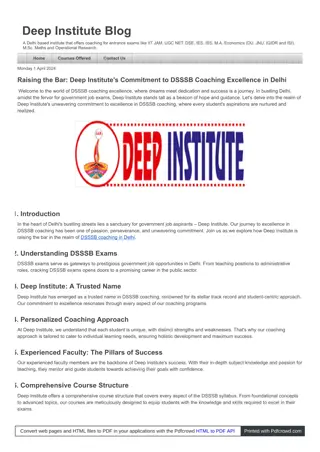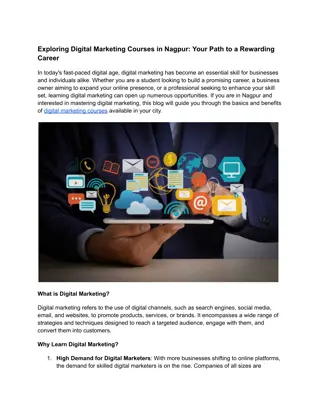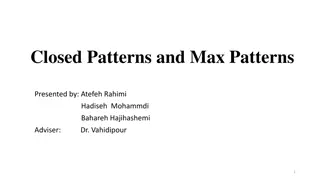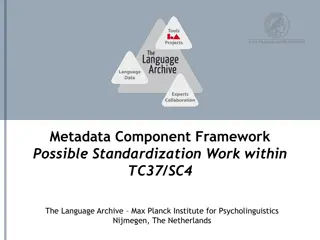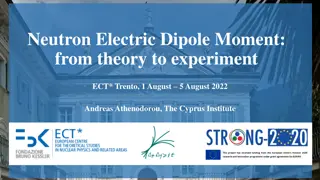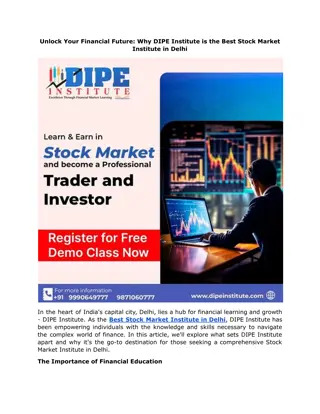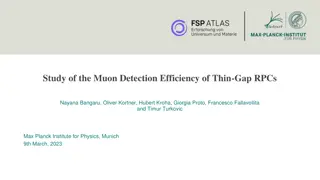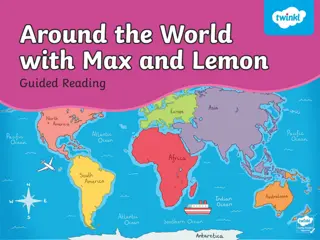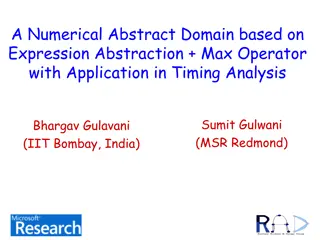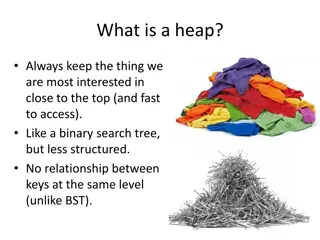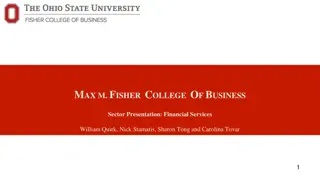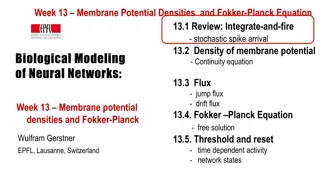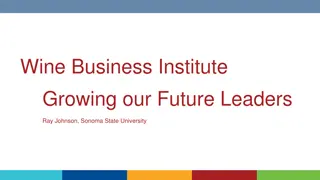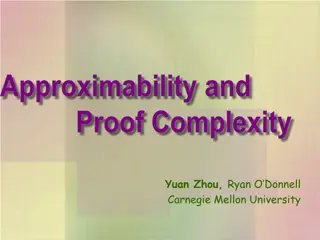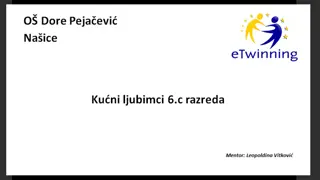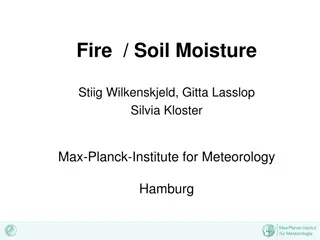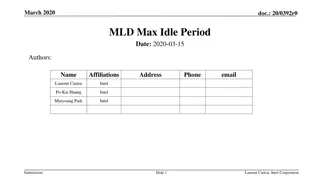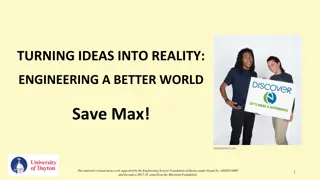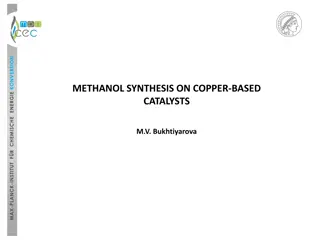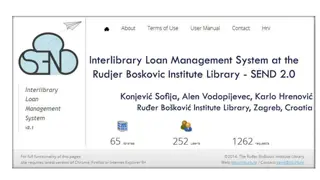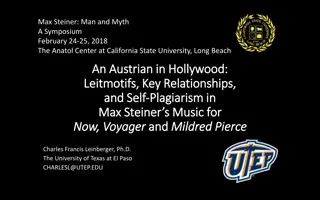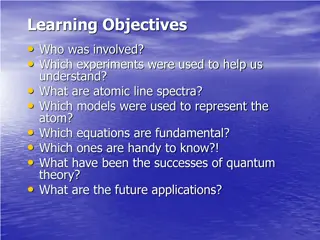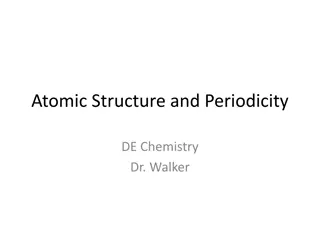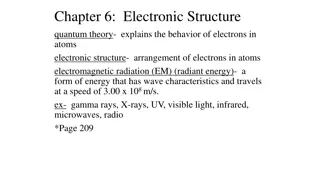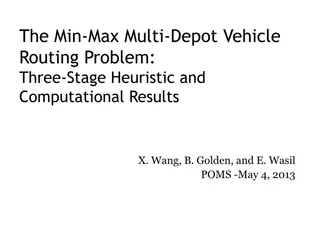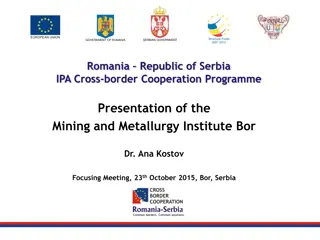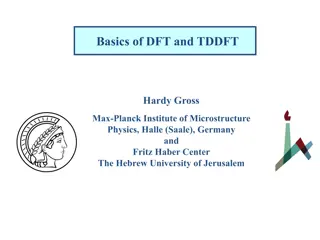DIGITAL MARKETING TRAINING INSTITUTE IN BANGALORE
NIDM (National Institute Of Digital Marketing) Bangalore Is One Of The Leading & best Digital Marketing Institute In Bangalore, India And We Have Brand Value For The Quality Of Education Which We Provide. Our Curriculum\/ Courses Are Designed with Practical knowledge and are Fully For Job Orientatio
15 views • 15 slides
Refreshing Mr. Fog Max Blue Raspberry Lemon Ice Vape
Indulge in the rich, sweet essence of ripe grapes with Mr. Fog Max Grape. This vape blend captures the authentic taste of fresh grapes. https:\/\/shorturl.at\/rsxZ7
1 views • 6 slides
Deep Institute: Your Path to DSSSB Triumph in Delhi
Deep Institute prepares you for success in the DSSSB exams in the busy city of Delhi. Deep Institute is the best coaching institute in Delhi that provides a path to success according to the requirements of each student. With the help of our experienced faculty, personalized coaching, and complete st
2 views • 2 slides
Pilot Training Institute in Mumbai
Embark on your pilot journey at Airbuzz Training, the premier pilot training institute in Mumbai. With a dynamic learning environment and experienced instructors, we offer comprehensive programs to help you achieve your aviation goals. Our institute focuses on practical training and in-flight simula
2 views • 5 slides
Exploring Digital Marketing Courses in Nagpur_ Your Path to a Rewarding Career
Omega Institute in Nagpur is a premier educational institution dedicated to providing high-quality academic programs and professional training. With a focus on excellence and innovation, Omega Institute offers a wide range of courses designed to meet the needs of students and professionals alike. Th
0 views • 3 slides
Streamlined Online Warranty Claim Submission with MAX Robot
Simplify your Daikin warranty claim process by utilizing the efficient online form processing robot, MAX. Keep essential information handy for quick and future-proof claim submissions. Receive status updates and financial settlements promptly via email.
1 views • 21 slides
Ultimate Guide: Boost Your E-commerce Sales by 10x with Google’s Performance Max
Boost your eCommerce sales with Google's Pmax campaigns! Amidst growing online competition, Pmax can help your business stand out. Are you struggling to see results or want to start strong? This guide reveals secrets for creating high-converting Performance Max campaigns. Dive in to transform your a
1 views • 15 slides
Closed Patterns and Max Patterns in Data Mining
Explore the concepts of closed patterns and max patterns in data mining, along with challenges and solutions. Learn how closed patterns compress frequent patterns while maintaining support information, and how max patterns provide a lossy compression. Discover the difference between closed patterns
0 views • 10 slides
Buy Beads Max Online - dermafillerstore.com
Buy Beads Max Online is a high-quality crafting bead brand known for its vibrant colors and durable materials. These beads are perfect for various crafts, including jewelry making, decorating, and other creative projects.\nText\/ WhatsApp: 1 (234) 7
2 views • 5 slides
Evolution of Light Theory: From Wave Theory to Quantum Theory
At the turn of the century, the discovery of the photoelectric effect challenged the wave theory of light, leading to the development of the quantum theory by Max Planck and Albert Einstein. This new theory introduced the concept of discrete energy units known as quanta, bridging the gap between wav
2 views • 62 slides
Standardization Process for Metadata Components in Language Archives
The standardization process for metadata components within TC37/SC4 at the Language Archive Max Planck Institute involves analyzing existing metadata sets, seeking input from the CLARIN EU community, and determining the next steps for standardization. The process includes forming submission groups,
0 views • 23 slides
Workshop on Neutron Electric Dipole Moment: Theory to Experiment
Workshop on Neutron Electric Dipole Moment: Theory to Experiment will be held in Trento from August 1st to August 5th, 2022. The event aims to bridge the gap between theory and experiment in investigating the neutron EDM in Lattice QCD, Phenomenology, and Cosmology. Renowned speakers and financial s
1 views • 10 slides
Why DIPE Institute is the Best Stock Market Institute in Delhi
In the heart of India's capital city, Delhi, lies a hub for financial learning and growth - DIPE Institute. As the Best Stock Market Institute in Delhi, DIPE Institute has been empowering individuals with the knowledge and skills necessary to navigat
0 views • 3 slides
Study of Muon Detection Efficiency in Thin-Gap RPCs
Conducted at the Max Planck Institute for Physics in Munich, this study focuses on the detection efficiency of thin-gap Resistive Plate Chambers. The research explores the construction, working principles, and experimental setup of RPCs, emphasizing the need for sensitive frontend electronics for hi
0 views • 14 slides
Adventures with Max and Lemon
Embark on a journey Around the World with Max and Lemon through vivid illustrations as they seek uniqueness, encounter new friends, and explore diverse landscapes. Join Max in her quest for adventure, friendship, and discovery across different cultures and environments.
0 views • 24 slides
Numerical Abstract Domain with Max Operator in Timing Analysis
Explore a numerical abstract domain based on expression abstraction and the Max operator with applications in timing analysis. The challenges in timing analysis, such as disjunctive and non-linear bounds, are discussed along with simple examples illustrating these concepts. The difficulty of proving
0 views • 21 slides
Heaps - A Comprehensive Overview
Heaps are hierarchical data structures that prioritize the most important elements for quick access. This article explores the concept of heaps, types of heaps (such as min and max heaps), abstract data type, practical uses over binary search trees, storing heaps in memory with arrays, manipulations
0 views • 17 slides
Financial Services Sector Overview: Max M. Fisher College of Business Presentation
Sector presentation on Financial Services by William Quirk, Nick Stamatis, Sharon Tong, and Carolina Tovar from Max M. Fisher College of Business. The presentation covers the market size, performance, industries, top companies, and business analysis of the sector. It highlights the sector's performa
0 views • 36 slides
Membrane Potential Densities and the Fokker-Planck Equation in Neural Networks
Delve into the concepts of membrane potential densities and the Fokker-Planck Equation in neural networks, covering topics such as integrate-and-fire with stochastic spike arrival, continuity equation for membrane potential density, jump and drift flux, and the intriguing Fokker-Planck Equation.
0 views • 29 slides
Analysis of Absorption Properties of Conjugated Dyes
The analysis focuses on the absorption properties of conjugated dyes such as 1,1-diethyl-2,2-cyanine iodide (red), 1,1-diethyl-2,2-carbocyanine iodide (blue), and 1,1-diethyl-2,2-dicarbocyanine iodide (turquoise). It involves calculating lambda max for each dye based on a particle in a box model, co
0 views • 15 slides
Wine Business Institute: Nurturing Future Leaders in the Wine Industry
The Wine Business Institute at Sonoma State University is dedicated to fostering leadership in the wine business. Through innovative programs and partnerships, they aim to cultivate the next generation of industry leaders. With a focus on inclusive excellence, the institute connects students with to
0 views • 22 slides
Approximability and Proof Complexity in Constraint Satisfaction Problems
Explore the realm of constraint satisfaction problems, from Max-Cut to Unique Games, delving into approximation algorithms and NP-hardness. Dive into open questions surrounding the Unique Games Conjecture, the hardness of Max-Cut approximations, and the quest to approximate the Balanced Separator pr
0 views • 25 slides
Meet These Adorable Dogs: Labrador Max, Maltese Boni, and Playful Apica
Labrador Max is a playful and faithful six-year-old dog with white golden fluffy hair and big ears. Boni, the Maltese, is a cute three-year-old dog with white hair who loves cookies and sleeps under the bed. Apica, or Paws, is a one to two-year-old dog with brown fur, tiny legs, and a playful person
0 views • 28 slides
Insights on Fire and Soil Moisture Relationships from Max-Planck-Institute Research
Explore the fascinating research findings on the interaction between fire dynamics and soil moisture content, as studied by scientists from the Max-Planck-Institute for Meteorology in Hamburg. Discover details on burned areas, carbon emissions, biomass consumption, fire impacts on vegetation, and mo
0 views • 18 slides
ELAN as a Tool for Oral History Workshop Summary
ELAN, a tool developed over 15 years at the Max-Planck-Institute for Psycholinguistics, is utilized in various research contexts like language documentation, acquisition studies, gesture studies, and sign language studies. The workshop covers the introduction to ELAN, basic and advanced features, an
0 views • 14 slides
Proposal to Simplify MLD Max Idle Period for Non-AP MLDs
Proposal presented in March 2020.doc suggests defining the MLD Max Idle Period at the MLD level instead of the STA level for non-AP MLDs. The objective is to indicate to APs through keep-alive frames that the non-AP MLD is still active without needing to tear down multi-link setups. The proposal off
0 views • 4 slides
Engineering a Better World: Designing a Life Vest for Max
Engineers play a vital role in solving problems and shaping the future by creating and designing essential things for health, happiness, and safety. In this scenario, the challenge is to design, build, and test a life vest for Max, the family dog, who fell into the water. Through creativity, teamwor
0 views • 14 slides
Methanol Synthesis on Copper-Based Catalysts at Max Planck Institut
Methanol production using synthesis gas, studying CO2 hydrogenation for reduced CO2 emissions, and utilizing methanol as a hydrogen storage method are key areas of focus at the Max Planck Institut for Chemical Energy Conversion. The process involves methanol synthesis from CO2 and H2, with experimen
0 views • 19 slides
Ruer Bo kovi Institute Overview and SEND Online Presentation
Ruer Bo kovi Institute, founded in 1950, is the largest Croatian research institute in the field of science. The institute has 2 locations, 11 divisions, 3 centers, 82 research laboratories, and a vast library. SEND 1.0 is an electronic document acquiring system established in the RBI library, strea
0 views • 13 slides
TTS/UBL Max and Credit Window
TTS/UBL Max determines the maximum hours you can adjust your schedule by, with ETB transactions affecting your TTS Max. Learn how to calculate your TTS Max, the impact of ETB transactions on it, and how ETB drops and pickups can alter your TTS Max. Red Flag transactions do not increase TTS Max. The
0 views • 16 slides
Symposium on Max Steiner: Man and Myth - Music in Hollywood
Explore the symposium on Max Steiner, focusing on his music in Hollywood, including key relationships, leitmotifs, and self-plagiarism in films like "Now, Voyager" and "Mildred Pierce." Delve into the impact of Steiner's compositions and their significance in cinematic history.
0 views • 8 slides
Quantum Theory and Key Figures in Physics
Explore the evolution of quantum theory through the perspectives of renowned physicists such as Albert Einstein, Niels Bohr, Werner Heisenberg, Erwin Schrödinger, Prince Louis de Broglie, and Max Planck. Learn about atomic line spectra, fundamental equations, and models used to represent the atom.
0 views • 23 slides
Electromagnetic Radiation and Quantum Energy in Chemistry
Delve into the fundamentals of atomic structure, periodicity, and electromagnetic radiation in chemistry. Explore the concepts of wavelength, frequency, speed of light, and quantum energy. Learn about important terms, example problems, Max Planck's contributions, and the photoelectric effect. Unrave
0 views • 67 slides
Electronic Structure and Quantum Theory in Atoms
Electronic structure and quantum theory elucidate the behavior and arrangement of electrons in atoms, with a focus on electromagnetic radiation, wavelength, frequency, and the speed of light. The inverse relationship between frequency and wavelength is explored through practical examples involving r
0 views • 34 slides
Heuristic Approach for the Min-Max Multi-Depot Vehicle Routing Problem
This study explores a three-stage heuristic to solve the Min-Max Multi-Depot Vehicle Routing Problem (MDVRP), aiming to minimize the maximum distance traveled by vehicles. It covers an introduction to the problem, literature review, the importance of the min-max objective, and a heuristic solution m
0 views • 21 slides
Development of Mining and Metallurgy Institute Bor
The Mining and Metallurgy Institute Bor, founded in 1962, plays a crucial role in research, development, and economic growth in the region. With state-of-the-art facilities and a dedicated team, the institute focuses on scientific activities, experimental research, and providing solutions to complex
0 views • 14 slides
Engineering Teaching Excellence Institute Kathryn Dimiduk
The Engineering Teaching Excellence Institute led by Kathryn Dimiduk focuses on advancing teaching practices in engineering education. With a commitment to innovation, it offers tailored programs, resources, and support for educators striving for excellence. The institute's mission is to enhance lea
0 views • 32 slides
Basics of DFT and TDDFT
Delve into the fundamentals of Density Functional Theory (DFT) and Time-Dependent Density Functional Theory (TDDFT) through the works of Hardy Gross, a prominent researcher at Max-Planck Institute of Microstructure Physics. Explore the Hamiltonian of condensed matter systems, including atoms, molecu
0 views • 36 slides
IVF Cost In Max Hospital – IVF In Delhi Cost
One of the top medical facilities in India, Max Hospital, provides In Vitro Fertilization (IVF) and other cutting-edge fertility procedures at affordable costs. An IVF cycle at Max Hospital normally costs between \u20b91,50,000 and \u20b92,50,000, de
0 views • 2 slides


